It’s that time of year again, when us music bloggers write our end-of-year lists of the albums that have impressed us over the past twelve months.
Usual caveats apply, of course, there are no doubt plenty of superb albums from 2015 I have yet to hear, and won’t be on my radar screen until I see them on other people’s end-of-year lists. Which, in a nutshell, is really the whole point of these things. I still think lists compiled by committees for general music publications are largely a waste of time. But this is not one of those lists.
There are 25 in my list this year, and here’s part one, going from 25 down to 18. They’re not in any particular order, consider them all 18-equal.
Caligula’s Horse – Bloom
 State of the art twin-guitar prog-metal from Australia, filled with serpentine riffs, memorable vocal melodies and some spectacular soloing. It combines the dynamics of mid-period Opeth with the modern jazz-metal experimentation of Haken and Maschine with the atmospherics of Riverside, while managing to avoid sounding remotely derivaive.
State of the art twin-guitar prog-metal from Australia, filled with serpentine riffs, memorable vocal melodies and some spectacular soloing. It combines the dynamics of mid-period Opeth with the modern jazz-metal experimentation of Haken and Maschine with the atmospherics of Riverside, while managing to avoid sounding remotely derivaive.
Kamchatka – A Long Road Made of Gold
 The Swedish power-trio deliver some classy blues-based hard rock. There’s an emphasis on tight arrangements, with punchy songs and short but effective blasts of shredding lead guitar, with a superb production that makes it sound as though the band are playing in your living room.
The Swedish power-trio deliver some classy blues-based hard rock. There’s an emphasis on tight arrangements, with punchy songs and short but effective blasts of shredding lead guitar, with a superb production that makes it sound as though the band are playing in your living room.
Muse – Drones
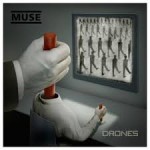 Teignmouth’s finest take a step back from the Queen-with-kitchen-sinks approach of their last couple of albums in favour of something of stripped-down guitar-driven power trio approach of their early albums. But when you’ve got Mutt Lange of AC/DC fame as producer, “stripped-down” is still a relative thing. There’s still a big expansive sounds that goes from hard rock boogie to a nod to spaghetti western soundtracks. This is still a Muse album, after all.
Teignmouth’s finest take a step back from the Queen-with-kitchen-sinks approach of their last couple of albums in favour of something of stripped-down guitar-driven power trio approach of their early albums. But when you’ve got Mutt Lange of AC/DC fame as producer, “stripped-down” is still a relative thing. There’s still a big expansive sounds that goes from hard rock boogie to a nod to spaghetti western soundtracks. This is still a Muse album, after all.
Pope Francis – Wake Up
 Not many people would have put “The Pope releases bonkers prog-rock album” in their musical predictions for 2015. One of the years strangest releases mixes excepts from sermons with a blend of traditional church music and progressive rock with a nod to world music. The combination of spoken word with big minor-key choral crescendos and the occasional blast of full-on rock guitar is worth a listen for anyone who appreciates things like Mostly Autumn’s “The Gap Is Too Wide”. It certainly makes evangelical protestant worship music look tame by comparison.
Not many people would have put “The Pope releases bonkers prog-rock album” in their musical predictions for 2015. One of the years strangest releases mixes excepts from sermons with a blend of traditional church music and progressive rock with a nod to world music. The combination of spoken word with big minor-key choral crescendos and the occasional blast of full-on rock guitar is worth a listen for anyone who appreciates things like Mostly Autumn’s “The Gap Is Too Wide”. It certainly makes evangelical protestant worship music look tame by comparison.
Praying Mantis – Legacy
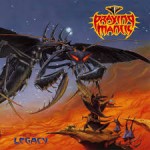 The tenth album by one-time NWOBHM heroes is polished twin-guitar hard rock, more AOR than metal, with echoes of Uriah Heep and Journey. Remarkable in its consistency, there is no filler and every track has something to like about it. Just occasionally it skirts on the edge of cheese, but most of the time this is a classy piece of work.
The tenth album by one-time NWOBHM heroes is polished twin-guitar hard rock, more AOR than metal, with echoes of Uriah Heep and Journey. Remarkable in its consistency, there is no filler and every track has something to like about it. Just occasionally it skirts on the edge of cheese, but most of the time this is a classy piece of work.
Queensrÿche – Condition: Hüman
 With new vocalist Todd Le Torre the prog-metal pioneers recover some of their mojo, with a record that evokes the spirit of the 1980s heyday, with soaring vocals and razor-sharp riffs. It doesn’t quite reach the heights of their peerless 80s masterpieces, but it’s still the best thing they’ve done for many years, and certainly blows Geoff Tate’s lacklustre album “The Key” clean out of the water.
With new vocalist Todd Le Torre the prog-metal pioneers recover some of their mojo, with a record that evokes the spirit of the 1980s heyday, with soaring vocals and razor-sharp riffs. It doesn’t quite reach the heights of their peerless 80s masterpieces, but it’s still the best thing they’ve done for many years, and certainly blows Geoff Tate’s lacklustre album “The Key” clean out of the water.
Secrets of the Sky – Pathway
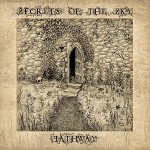 This Californian band brew up a monstrous wall of sound. With no choruses or solos the songs take the form of dense soundscapes of layered guitars, doom-laden drums and washes of keys. With evil-sounding growls for the heavy parts and clean vocals for the reflective, atmospheric moments, the end result is an intense and in places very heavy record where even the lighter parts can sound truly menacing.
This Californian band brew up a monstrous wall of sound. With no choruses or solos the songs take the form of dense soundscapes of layered guitars, doom-laden drums and washes of keys. With evil-sounding growls for the heavy parts and clean vocals for the reflective, atmospheric moments, the end result is an intense and in places very heavy record where even the lighter parts can sound truly menacing.
Spock’s Beard – The Oblivion Particle
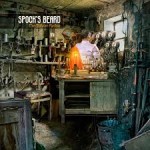 Their twelfth album has verything we’ve come to expect from a Spock’s Beard record; swirling Mellotron and Hammond organ, blasts of hard rock guitar, rich layered vocal harmonies, and a strong sense of melody. Spock’s Beard again succeed by having one foot in the past and one in the present; creating a delightfully retro sound with a modern sensibility.
Their twelfth album has verything we’ve come to expect from a Spock’s Beard record; swirling Mellotron and Hammond organ, blasts of hard rock guitar, rich layered vocal harmonies, and a strong sense of melody. Spock’s Beard again succeed by having one foot in the past and one in the present; creating a delightfully retro sound with a modern sensibility.
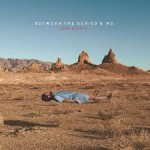 A quite remarkable record that sounds like all the best bits of contemporary metal and progressive rock from the last decade put into a blender. It’s hugely varied with musical references all over the place, yet it still hangs together as a coherent whole. There is an awful lot happening on this record, and it does take a few listens to take it all in. Songs take off in unpredictable directions, and there is more than one number that feels as though it contains a whole concept album’s worth of music in seven or eight minutes.
A quite remarkable record that sounds like all the best bits of contemporary metal and progressive rock from the last decade put into a blender. It’s hugely varied with musical references all over the place, yet it still hangs together as a coherent whole. There is an awful lot happening on this record, and it does take a few listens to take it all in. Songs take off in unpredictable directions, and there is more than one number that feels as though it contains a whole concept album’s worth of music in seven or eight minutes.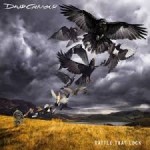 This highly polished singer-songwriter album is perhaps more satisfying that Pink Floyd’s coda “The Endless River”. Though it does tend towards the middle of the road in places, Gilmour’s immediately recognisable lead guitar lights up every song and sets this record apart. While it doesn’t reach the epic grandeur of Pink Floyd’s heyday. it’s still as much about the gorgeous orchestrated arrangements as it is about the songs.
This highly polished singer-songwriter album is perhaps more satisfying that Pink Floyd’s coda “The Endless River”. Though it does tend towards the middle of the road in places, Gilmour’s immediately recognisable lead guitar lights up every song and sets this record apart. While it doesn’t reach the epic grandeur of Pink Floyd’s heyday. it’s still as much about the gorgeous orchestrated arrangements as it is about the songs.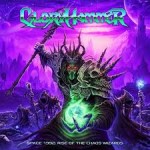 Dundee’s finest power-metallers return with the follow-up to “Tales from the Kingdom of Fife” in which the hero Angus McFife takes the battle with the evil sorcerer Zargothrax to outer space, where he encounters The Goblin King of the Darkthrone Galaxy, and with the aid of the legendary Astral Hammer and The Hollywood Hootsman defeats the sorcerer in epic battle. Unfortunately Earth and all its inhabitants were destroyed in the process, but nobody noticed because Chaos Magic. But that’s power metal for you…
Dundee’s finest power-metallers return with the follow-up to “Tales from the Kingdom of Fife” in which the hero Angus McFife takes the battle with the evil sorcerer Zargothrax to outer space, where he encounters The Goblin King of the Darkthrone Galaxy, and with the aid of the legendary Astral Hammer and The Hollywood Hootsman defeats the sorcerer in epic battle. Unfortunately Earth and all its inhabitants were destroyed in the process, but nobody noticed because Chaos Magic. But that’s power metal for you…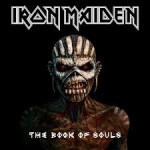 The metal veterans and British institution continue a strong recent run of albums with one of the most ambitious things they’ve ever done, a double album that might just be their best record they’ve made since their 1980s heyday. They’ve managed a double album without filler, covering all bases from galloping rockers to ambitious epics. It culminates with “Empire of the Clouds”, an eighteen-minute tour-de-force which combines Bruce Dickenson’s loves of history and aviation, telling the story of the ill-fated maiden voyage of the R101 airship.
The metal veterans and British institution continue a strong recent run of albums with one of the most ambitious things they’ve ever done, a double album that might just be their best record they’ve made since their 1980s heyday. They’ve managed a double album without filler, covering all bases from galloping rockers to ambitious epics. It culminates with “Empire of the Clouds”, an eighteen-minute tour-de-force which combines Bruce Dickenson’s loves of history and aviation, telling the story of the ill-fated maiden voyage of the R101 airship. Lemmy’s increasingly frail health means Motörhead aren’t the live force they once were, but in the studio it’s another matter. Lemmy has still got it, and accompanied by Mikky Dee and the underrated Phil Campbell, they rock like a bastard, with songs that barrel along like a runaway train. On record at least, with what might prove to be their final album, Motorhead are still the epitome of the primal spirit of Rock’n'Roll, Britain’s equivalent to The Ramones.
Lemmy’s increasingly frail health means Motörhead aren’t the live force they once were, but in the studio it’s another matter. Lemmy has still got it, and accompanied by Mikky Dee and the underrated Phil Campbell, they rock like a bastard, with songs that barrel along like a runaway train. On record at least, with what might prove to be their final album, Motorhead are still the epitome of the primal spirit of Rock’n'Roll, Britain’s equivalent to The Ramones. Napalm Death are very angry. It’s hard to make out the words, so it’s not always obvious exactly what they’re angry about, but they’re very, very angry. They combine the visceral fury of punk with the precision of metal, to produce an album that tears out of the speakers and nails you to the wall. Napalm Death show absolutely no signs of mellowing in their old age, and they’ve made a record that’s utterly uncompromising.
Napalm Death are very angry. It’s hard to make out the words, so it’s not always obvious exactly what they’re angry about, but they’re very, very angry. They combine the visceral fury of punk with the precision of metal, to produce an album that tears out of the speakers and nails you to the wall. Napalm Death show absolutely no signs of mellowing in their old age, and they’ve made a record that’s utterly uncompromising.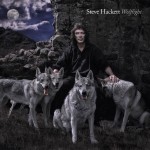 The former Genesis guitarist has gained a high profile with his Genesis revival show of late, but he’s also hit a late career purple patch with a string of excellent albums, of which this might be one of the finest. It’s a huge symphonic-sounding work, dominated by his distinctive liquid guitar playing and gorgeous harmony vocals. Just ignore the cover art with the embarrassed wolves and focus on the music.
The former Genesis guitarist has gained a high profile with his Genesis revival show of late, but he’s also hit a late career purple patch with a string of excellent albums, of which this might be one of the finest. It’s a huge symphonic-sounding work, dominated by his distinctive liquid guitar playing and gorgeous harmony vocals. Just ignore the cover art with the embarrassed wolves and focus on the music. The Norwegian six-piece pick up where they left off with last year’s “Demon”. The vibe resembles late period Talk Talk crossed with Storm Corrosion, sinister atmospheric soundscapes making prominent use of violin and the occasional irruptions of central European folk motifs. But be careful when you play it. The sound resembling modem noises at the very end of “Molok Rising” is a code which may destroy the universe.
The Norwegian six-piece pick up where they left off with last year’s “Demon”. The vibe resembles late period Talk Talk crossed with Storm Corrosion, sinister atmospheric soundscapes making prominent use of violin and the occasional irruptions of central European folk motifs. But be careful when you play it. The sound resembling modem noises at the very end of “Molok Rising” is a code which may destroy the universe. Lonely Robot is the project from John Mitchell of It Bites, Arena and Frost* fame, with a all-star supporting cast including Nick Beggs, Go West’s Peter Cox, Marillion’s Steve Hogarth, Heather Findlay and Kim Seviour. The end result is a varied but hugely impressive album. It goes from dense guitar-heavy industrial prog-metal to gorgeous ballads to uptempo 80s-style pop-rock, with imaginative arrangements that frequently veer off in unexpected directions.
Lonely Robot is the project from John Mitchell of It Bites, Arena and Frost* fame, with a all-star supporting cast including Nick Beggs, Go West’s Peter Cox, Marillion’s Steve Hogarth, Heather Findlay and Kim Seviour. The end result is a varied but hugely impressive album. It goes from dense guitar-heavy industrial prog-metal to gorgeous ballads to uptempo 80s-style pop-rock, with imaginative arrangements that frequently veer off in unexpected directions.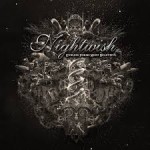 The latest release by the Finnish masters of symphonic metal marks the studio début of lead singer Floor Jansen, and is also the first to feature celtic folk multi-instrumentalist Troy Donockley as a full member of the band. It’s rather heavier than their previous “Imaginaerum“, thought the straight-up metal numbers end up less interesting than the soaring ballads and folk-rock workouts. It might have done without the spoken word parts from the odious Richard Dawkins, though at least he’s talking about evolutionary biology here.
The latest release by the Finnish masters of symphonic metal marks the studio début of lead singer Floor Jansen, and is also the first to feature celtic folk multi-instrumentalist Troy Donockley as a full member of the band. It’s rather heavier than their previous “Imaginaerum“, thought the straight-up metal numbers end up less interesting than the soaring ballads and folk-rock workouts. It might have done without the spoken word parts from the odious Richard Dawkins, though at least he’s talking about evolutionary biology here.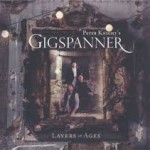 Gigspanner are an acoustic trio led by former Steeleye Span fiddle player Peter Knight, and Layers of Ages sees imaginative arrangements of traditional folk numbers. Though not an instrumental record, Knight’s evocative and lyrical violin playing is the heart of the sound, full of melody and emotion. Much like contemporary jazz, some modern folk has a lot of appeal for fans of progressive rock wanting to venture out of their comfort zone, and this record is a very good place to start.
Gigspanner are an acoustic trio led by former Steeleye Span fiddle player Peter Knight, and Layers of Ages sees imaginative arrangements of traditional folk numbers. Though not an instrumental record, Knight’s evocative and lyrical violin playing is the heart of the sound, full of melody and emotion. Much like contemporary jazz, some modern folk has a lot of appeal for fans of progressive rock wanting to venture out of their comfort zone, and this record is a very good place to start. Steven Wilson’s third release following the dissolution of Porcupine Tree is an ambitious concept album about isolation that’s drawn comparisons with Pink Floyd’s “The Wall” and Marillion’s “Brave”. He reins in the wind-driven jazz-rock elements in favour of more guitar-centred sound that’s closer to the spirit of Porcupine Tree than earlier solo releases, going from stripped-back minimalism that evokes XTC to dense layered prog-metal workouts. It’s perhaps not quite as consistently strong as “The Raven That Refused to Sing”, but nevertheless contains many powerful moments.
Steven Wilson’s third release following the dissolution of Porcupine Tree is an ambitious concept album about isolation that’s drawn comparisons with Pink Floyd’s “The Wall” and Marillion’s “Brave”. He reins in the wind-driven jazz-rock elements in favour of more guitar-centred sound that’s closer to the spirit of Porcupine Tree than earlier solo releases, going from stripped-back minimalism that evokes XTC to dense layered prog-metal workouts. It’s perhaps not quite as consistently strong as “The Raven That Refused to Sing”, but nevertheless contains many powerful moments.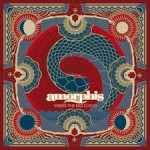 What is it about Scandinavia and metal? A disproportionate number of the most imaginative and innovative metal of recent years has come from Sweden, Norway and especially Finland. Amorphis hail from the last of those nations, and have delivered a quite remarkable record which cannot be pigeonholed in any of metal’s narrow subgenres. There are moments of death metal, folk metal and gothic rock, and the occasional nod to 70s classic rock. It can be piledrivingly heavy at times, but always hugely melodic, with melodies that owe as much to the twin guitars as the vocals. Like the best metal bands they demonstrates superb use of dynamics. Many songs combine clear vocals with death growls, often using one style on the verse and the other on the chorus. As a contemporary metal album this record is absolutely state of the art.
What is it about Scandinavia and metal? A disproportionate number of the most imaginative and innovative metal of recent years has come from Sweden, Norway and especially Finland. Amorphis hail from the last of those nations, and have delivered a quite remarkable record which cannot be pigeonholed in any of metal’s narrow subgenres. There are moments of death metal, folk metal and gothic rock, and the occasional nod to 70s classic rock. It can be piledrivingly heavy at times, but always hugely melodic, with melodies that owe as much to the twin guitars as the vocals. Like the best metal bands they demonstrates superb use of dynamics. Many songs combine clear vocals with death growls, often using one style on the verse and the other on the chorus. As a contemporary metal album this record is absolutely state of the art. Karnataka’s fifth studio album is a very different beast from 2007′s “The Gathering Light”, as much so as that album was from “Delicate Flame of Desire”. But the three were the products of three very different bands. The newest incarnation of Karnataka with Hayley Griffiths on vocals and Cagri Tozluoglu on keys have come up with a huge-sounding record with more than a hint of European symphonic metal about it, with recurring lyrical themes of adultery and betrayal. The early part of the album is filled with hook-laden potential singles. Then it closes with the twenty-minute title track which combines evocative celtic soundscapes with massive symphonic rock crescendos and features a guest appearance from Troy Donockley. With this record Karnataka managed to take on the likes of Nightwish and beat them at their own game, which is no mean achievement.
Karnataka’s fifth studio album is a very different beast from 2007′s “The Gathering Light”, as much so as that album was from “Delicate Flame of Desire”. But the three were the products of three very different bands. The newest incarnation of Karnataka with Hayley Griffiths on vocals and Cagri Tozluoglu on keys have come up with a huge-sounding record with more than a hint of European symphonic metal about it, with recurring lyrical themes of adultery and betrayal. The early part of the album is filled with hook-laden potential singles. Then it closes with the twenty-minute title track which combines evocative celtic soundscapes with massive symphonic rock crescendos and features a guest appearance from Troy Donockley. With this record Karnataka managed to take on the likes of Nightwish and beat them at their own game, which is no mean achievement. It been four years since the Yorkshire guitarist and singer-songwriter released her début album, but the follow-up not only proved to be well worth the wait, but is a very different sort of record. With a “Southern Gothic” theme it’s heavier, darker and far more song-focussed, with elements of grunge and progressive rock. There’s more emphasis on memorable riffs than on extended guitar wig-outs; she takes a less-is-more approach to soloing. Hard rockers alternate with delicate acoustic numbers, and the album closes with the ambitious kaleidoscopic epic “Walk on Land”.
It been four years since the Yorkshire guitarist and singer-songwriter released her début album, but the follow-up not only proved to be well worth the wait, but is a very different sort of record. With a “Southern Gothic” theme it’s heavier, darker and far more song-focussed, with elements of grunge and progressive rock. There’s more emphasis on memorable riffs than on extended guitar wig-outs; she takes a less-is-more approach to soloing. Hard rockers alternate with delicate acoustic numbers, and the album closes with the ambitious kaleidoscopic epic “Walk on Land”. The self-titled solo album by the Pineapple Thief mainman is a thing of beauty, with echoes of Guy Garvey, recent Anathema and Steven Wilson at his less bombastic. It’s an album of soaring atmospheric soundscapes, often semi-acoustic but always hugely melodic, with arrangements varying from acoustic minimalism to richly layered. It takes one unexpected sharp left turn early on with the disco-funk of “The Odds”, but the gorgeously dreamy “Born in Delusion” and “Familiar Patterns” are far more representative of the album. Quite different in mood to The Pineapple Thief, but a very enjoyable record.
The self-titled solo album by the Pineapple Thief mainman is a thing of beauty, with echoes of Guy Garvey, recent Anathema and Steven Wilson at his less bombastic. It’s an album of soaring atmospheric soundscapes, often semi-acoustic but always hugely melodic, with arrangements varying from acoustic minimalism to richly layered. It takes one unexpected sharp left turn early on with the disco-funk of “The Odds”, but the gorgeously dreamy “Born in Delusion” and “Familiar Patterns” are far more representative of the album. Quite different in mood to The Pineapple Thief, but a very enjoyable record.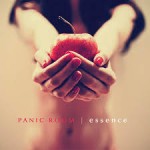 The Kickstarter-funded unplugged album reworks favourites from the band’s first three albums into radically different forms, resulting in a beautiful record than emphasises Anne-Marie Helder’s remarkable vocal talent. Though it crosses the streams with the acoustic side-project Luna Rossa to some extent it’s still got more of a Panic Room vibe. It’s not entirely acoustic, since new guitarist Dave Foster cuts loose on electric a few times. There are a couple of new songs too, the classic Anne-Marie Helder ballad “Rain & Tears & Burgundy”, and “Denial”, the first time Panic Room have ever recorded a blues number.
The Kickstarter-funded unplugged album reworks favourites from the band’s first three albums into radically different forms, resulting in a beautiful record than emphasises Anne-Marie Helder’s remarkable vocal talent. Though it crosses the streams with the acoustic side-project Luna Rossa to some extent it’s still got more of a Panic Room vibe. It’s not entirely acoustic, since new guitarist Dave Foster cuts loose on electric a few times. There are a couple of new songs too, the classic Anne-Marie Helder ballad “Rain & Tears & Burgundy”, and “Denial”, the first time Panic Room have ever recorded a blues number.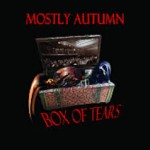 A live recording of last year’s “Dressed in Voices”, an album regarded by many as their career defining masterpiece. Unlike their other recent live albums this one’s a single disk of the Dressed in Voices set rather than the whole show (Do we really need yet another live version of “Evergreen” or “Heroes”? I don’t think so). But like those other live albums it does capture the power and intensity of the Mostly Autumn’s live performances, the big sound of the seven-piece band at full tilt.
A live recording of last year’s “Dressed in Voices”, an album regarded by many as their career defining masterpiece. Unlike their other recent live albums this one’s a single disk of the Dressed in Voices set rather than the whole show (Do we really need yet another live version of “Evergreen” or “Heroes”? I don’t think so). But like those other live albums it does capture the power and intensity of the Mostly Autumn’s live performances, the big sound of the seven-piece band at full tilt.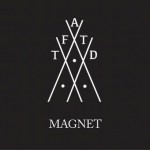 Matt Stevens’ four-piece instrumental noise merchants could be described as a sort of punk version of King Crimson. Their latest EP sees a move away from the garage-rock feel of their last record. “Spooky Action”. Magnet is darker and denser, with more of a focus on the post-rock and electronica side of their music. Like all of their records, it has feet in many camps, defies simple categorisation, and makes a rewarding listen for anyone who wants to get out of their musical comfort zones.
Matt Stevens’ four-piece instrumental noise merchants could be described as a sort of punk version of King Crimson. Their latest EP sees a move away from the garage-rock feel of their last record. “Spooky Action”. Magnet is darker and denser, with more of a focus on the post-rock and electronica side of their music. Like all of their records, it has feet in many camps, defies simple categorisation, and makes a rewarding listen for anyone who wants to get out of their musical comfort zones. A taster from the forthcoming album “The Illusion’s Reckoning”, three songs with a strong 70s classic rock vibe with echoes of Fleetwood Mac and Led Zeppelin. The lead song in particular is lovely, with Heather Findlay playing to her strengths as a vocalist, and features a short but very effective guitar break from Dave Kilminster.
A taster from the forthcoming album “The Illusion’s Reckoning”, three songs with a strong 70s classic rock vibe with echoes of Fleetwood Mac and Led Zeppelin. The lead song in particular is lovely, with Heather Findlay playing to her strengths as a vocalist, and features a short but very effective guitar break from Dave Kilminster. The band formerly know as Mermaid Kiss return with a new singer in the shape of Maria Milewska and a new name. The four-track suite “The River” was originally slated to be part of a full-length album, but has mow been spun off as a separate EP on its own. It’s largely acoustic, piano and acoustic guitar based songs with woodwind and strings for colour, plus some touches of electronica, and Maria Milewska proves to be excellent singer. Highlights are the woodwinds meet trip-hop instrumental “The Undertow” and the gorgeously atmospheric closing number “Rivergirl”, but the whole EP is excellent.
The band formerly know as Mermaid Kiss return with a new singer in the shape of Maria Milewska and a new name. The four-track suite “The River” was originally slated to be part of a full-length album, but has mow been spun off as a separate EP on its own. It’s largely acoustic, piano and acoustic guitar based songs with woodwind and strings for colour, plus some touches of electronica, and Maria Milewska proves to be excellent singer. Highlights are the woodwinds meet trip-hop instrumental “The Undertow” and the gorgeously atmospheric closing number “Rivergirl”, but the whole EP is excellent.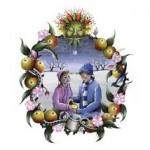 This intermediate release filling the gap before their next full-length album eschews ambitious multi-part epics in favour of more straightforward songwriting. But most of the things we’ve come to expect from Big Big Train are present; big soaring melodies and rich layered arrangements that evoke the spirit of 70s pastoral progressive rock with lyrics steeped in English landscapes and history. The largely instrumental keyboard-heavy “Mudlarks” ticks a lot of classic prog-rock boxes, but with the woodwinds, violins and 12-string guitars there’s also an element of 70s electric folk-rock. It’s all delightfully retro in its use of vintage guitars and keyboard sounds, but that’s always been a major part of their appeal.
This intermediate release filling the gap before their next full-length album eschews ambitious multi-part epics in favour of more straightforward songwriting. But most of the things we’ve come to expect from Big Big Train are present; big soaring melodies and rich layered arrangements that evoke the spirit of 70s pastoral progressive rock with lyrics steeped in English landscapes and history. The largely instrumental keyboard-heavy “Mudlarks” ticks a lot of classic prog-rock boxes, but with the woodwinds, violins and 12-string guitars there’s also an element of 70s electric folk-rock. It’s all delightfully retro in its use of vintage guitars and keyboard sounds, but that’s always been a major part of their appeal.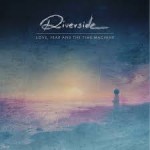 It was extremely hard to choose just one single record as album of the year. Even after I had begun publishing the first few instalments of this rundown I hadn’t been able to make the final decision of which record out of at least three was the best of them all. Karnataka and Amorphis in particular have both made astonishingly good records this year.
It was extremely hard to choose just one single record as album of the year. Even after I had begun publishing the first few instalments of this rundown I hadn’t been able to make the final decision of which record out of at least three was the best of them all. Karnataka and Amorphis in particular have both made astonishingly good records this year.